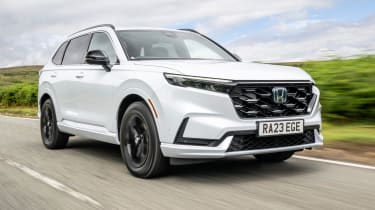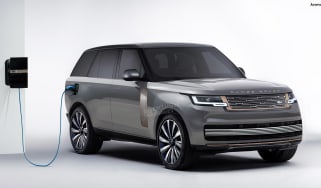New Honda CR-V 2023 review
The latest CR-V is mostly an improvement over its predecessor, but the plug-in hybrid fails to outshine its rivals

Verdict
The sixth-generation CR-V is bigger and much more clever than its predecessor, but in practice the new plug-in hybrid variant is going to be tricky to recommend. Its closest rival, the Toyota RAV4 PHEV, offers much more power and better road manners for significantly less money. Unless you’re a company car user benefiting from the excellent Benefit in Kind costs, the cheaper e:HEV hybrid models will make much more sense.
Honda has a rich history of being the first to introduce new tech to the market. It was the first brand to produce a production car with map-based satellite navigation (the 1981 Accord), the first to produce all-wheel steering (the 1987 Prelude), and the first to sell a hybrid production vehicle in the UK with its sleek Insight.
With its original CR-V, it came a close second in kicking off a class we now refer to as the family SUV - pipped only by its Japanese rival Toyota and the RAV4. The CR-V is now in its sixth generation, and we’re driving the newcomer for the first time.
Given that Honda is a brand known for firsts, there’s some irony in the fact that this CR-V will be the first petrol/electric plug-in hybrid car the brand has ever produced for Europe – some 10 years after Mitsubishi offered the Outlander PHEV in this very segment.
More reviews
We’ll come onto the tech later, but let’s start with the styling. This sixth-gen model takes on a more modern, dynamic look than its predecessor, especially at the front, thanks to its slim, sharp LED headlights and the cleaner bumper and grille designs than on its predecessor. Meanwhile, the high-level vertical tail-lights remain similar form to before, passing on some family resemblance to the newcomer.
Inside, the dashboard layout is nearly identical to the latest Civic’s. In other words, it’s very clean, and the main controls (including physical knobs and buttons for the air-conditioning) all sit exactly where you’d expect them to. It’s not the most dramatic cabin in its class, but it’s one of the easiest to figure out.
Further back, Honda has boosted the practicality. Rear kneeroom is very impressive - up 16mm on the last car, but also easily on a par with rivals like the Toyota RAV4. The rear seatbacks can recline through eight positions, and the flat floor and wide centre seat make it a comfy place for three. The boot is generous too; including the underfloor storage area – ideal for holding charge cables – there’s 635 litres of storage.
Being late to the PHEV party has clearly given time for Honda to size up the competition and deliver something a little different, though. The starting point is the same 2.0-litre Atkinson cycle engine/electric motor combination that is used to power the current Civic e:HEV, the new ZR-V, and indeed lower-level versions of the CR-V.
But rather than the modest 1.06kWh battery of those cars, the plug-in hybrid model gets a much larger 17.7kWh unit. As a result, the PHEV emits just 18g/km of CO2 in WLTP testing and is able to travel up to 51 miles on a single charge. That slots the CR-V comfortably within the eight per cent company car tax band, while the 6.8kW charger allows for a recharge in two and a half hours.

When the petrol engine is called into action, it doesn’t often drive the wheels directly. Instead, it acts as a generator to send energy to the electric motor. At higher speeds, the petrol engine can drive the wheels - a system which Honda says is a more efficient way of doing things. Even with the battery depleted, Honda claims the efficiency of this layout lets the CR-V hit an impressive 45.6mpg.
The PHEV’s larger battery allows another setting, in which both electric and petrol power send drive at the same time for extended periods. This, says Honda, delivers enough torque to tow a trailer of up to 1,500kg.
Initially, the system impresses. It’s as smooth as a full EV, making it very easy to drive in everyday use. Even when the engine does kick in, it’s quite peaceful - unless Sport mode is engaged, that is, when the CR-V pipes an augmented sound through the speakers, reminding us of a digitised Civic Type R.
The problem is, the performance isn’t anything like that of many of its closest rivals, let alone a Civic Type R. With 181bhp and 335Nm, this CR-V is well short of the Toyota RAV4 PHEV and its 302bhp.
Beyond its sprightly performance from zero to 20mph, the Honda feels a little flat. You’ll need to use plenty of throttle travel to get up to speed, which means calling on the petrol engine much more frequently - and therefore using more fuel - than in its Japanese rival.
It’s best to drive it in a relaxed manner, then, which the CR-V is happy to do. Ride comfort is reasonable, but the nose-heavy handling that we experienced in the smaller ZR-V goes a step further here, with the limit of grip over the front axle less than we’ve experienced in rivals. There’s quite a noticeable amount of road noise coming from the rear wheels at speed, too.
You might argue that power and fun aren’t qualities that are relevant in this sector, but the RAV4 can offer all of that, match the Honda for comfort, and - most importantly - undercut the CR-V on price by a long way.
The Honda’s PHEV powertrain is only available in top-spec Advance Tech trim, and as a result, it costs a hefty £53,995. The RAV4 PHEV costs £44,140. Admittedly, the Honda comes with eleven airbags, excellent standard safety tech, and leather seats with heating and cooling upfront, so you get far more kit as standard, but for just £955 more than the CR-V, you can jump into the RAV4’s posher and identically powered cousin, the Lexus NX 450H+. That makes the Honda’s position look much more shaky.
| Model: | Honda CR-V e:PHEV Advance Tech |
| Price: | £53,995 |
| Powertrain: | 2.0-litre 4cyl, 17.7kWh battery, 1x e-motor |
| Power/torque: | 181bhp/335Nm |
| Transmission: | Single-speed automatic, front-wheel drive |
| 0-62mph: | 9.4 seconds |
| Top speed: | 121mph |
| Economy/CO2: | 353mpg / 18g/km |
| On sale: | 14 August |






